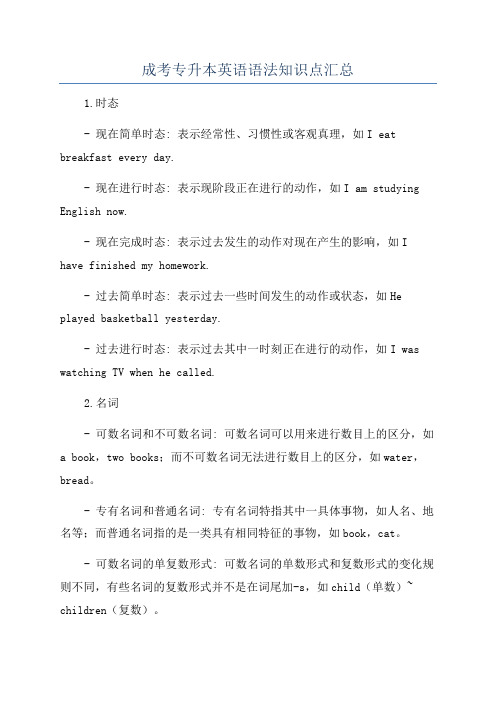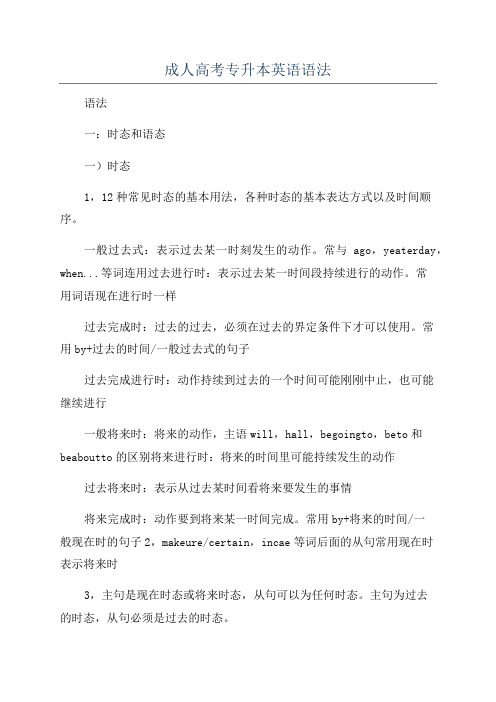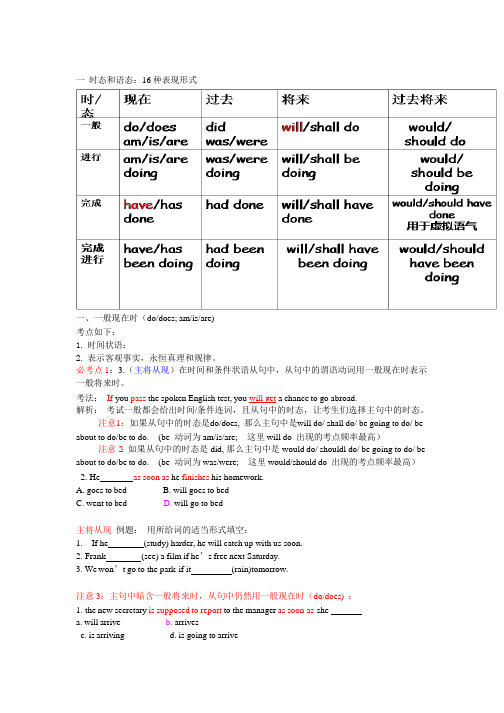成考专升本英语重点语法资料
成考专升本英语语法知识点汇总

成考专升本英语语法知识点汇总1.时态- 现在简单时态: 表示经常性、习惯性或客观真理,如I eat breakfast every day.- 现在进行时态: 表示现阶段正在进行的动作,如I am studying English now.- 现在完成时态: 表示过去发生的动作对现在产生的影响,如I have finished my homework.- 过去简单时态: 表示过去一些时间发生的动作或状态,如He played basketball yesterday.- 过去进行时态: 表示过去其中一时刻正在进行的动作,如I was watching TV when he called.2.名词- 可数名词和不可数名词: 可数名词可以用来进行数目上的区分,如a book,two books;而不可数名词无法进行数目上的区分,如water,bread。
- 专有名词和普通名词: 专有名词特指其中一具体事物,如人名、地名等;而普通名词指的是一类具有相同特征的事物,如book,cat。
- 可数名词的单复数形式: 可数名词的单数形式和复数形式的变化规则不同,有些名词的复数形式并不是在词尾加-s,如child(单数)~ children(复数)。
3.代词- 主格代词: 在句子中作主语或表语,如I,you,he,she。
- 宾格代词: 在句子中作宾语,如me,you,him,her。
- 形容词性物主代词: 表示所有关系,如my,your,his,her。
- 名词性物主代词: 在句子中作主语、宾语或表语,如mine,yours,his,hers。
- 反身代词: 在动词或介词后面,表示动作的反身,如myself,yourself,himself,herself。
4.冠词- 定冠词: 表示特指其中一个或其中一类人、物、事物,如the。
- 不定冠词: 表示泛指一个或一个以上的人、物、事物,如a,an。
- 零冠词: 不使用任何冠词的情况,如I have car.5.介词- 表示方位、时间、原因、目的等,如in,on,at,for,to。
全国成人高考专升本英语-考点汇编

第一部分语法第一章名词考点名词的复数形式1.名词的规则复数形式规则一:一般情况下,名词词尾直接加-s.规则二:以-s,-x,-ch,-sh结尾的名词,一般加-es。
规则三:“辅音字母+y”结尾的名词,变y为i,再加-es。
“元音字母+y”结尾的名词,词尾直接加-s。
规则四:“辅音字母+o”结尾的名词,有生命+es;“辅音字母+o”结尾的名词,无生命+s;“元音字母+o”结尾的名词,一般+s。
规则五:以-f或-fe结尾的名词,一般变-f或-fe为v,再加-es。
规则六:不规则变化记心中。
(1)改变单数名词的内部元音使其变成复数man—men;foot—feet(2)在单数名词词尾加-ren或-enchild—children;ox—oxen(3)复数形式与单数形式相同sheep—sheep;Chinese—Chinese(4)一些外来词仍然保留原来的名词复数形式basis—bases;thesis—theses2.合成名词的复数形式(1)如主体词为名词,将主体词改为复数。
son-in-law——sons-in-law女婿(2)如没有主体名词,则在最后一个词后加复数同尾。
grown-up——grown-ups成年人(3)以man和woman构成的合成名词,各个成分都变为复数。
第二章冠词考点1不定冠词的基本用法1.用在单数可数名词前表示“一,一个”。
There is a picture on the wall.墙上有一幅图画。
2.表示一类人或物,指同类中的任何一个,a或an不必翻译。
Even a child can answer this question.就是小孩子也能回答这个问题。
3.第一次提到某人或某物时,用不定冠词a或an,起介绍作用。
A girl wants to see you.一位姑娘要见你。
4.不定冠词用于单数可数名词前表示身份、职业,尤其用在作表语或宾语补足语的名词前。
She is a high school teacher.Her name is Li Fang..用于专有名词前,表示“一位叫……的人”。
成人专升本英语必考知识点

成人专升本英语必考知识点成人专升本英语必考知识点(精选3篇)要想取得好的成绩,就要好好备考哦,这样大家都能取得好的成绩。
你们关于英语的考试知识点有哪些呢?下面给大家分享成人专升本英语必考知识点,希望能够帮助大家!成人专升本英语必考知识点【篇1】1.But (但是) “I wont go. ”“But youve told me you would.”“Can I help you?”“Im afraid the box is too heavy for you, but thank you all the same.”2. yet ( 然而) They got to know each other a month ago, yet they have been in deep love now.(be in love 相爱) She has her weaknesses, yet that doesnt mean she is not qualified for the job.(be qualified for 胜任) She is not a native speaker, yet her French is adequate for the job.(be adequate for 胜任)3. however(然而) The text is difficult. It is , however, not beyond the reach of the students.At first the girl refused to go with him. Later, however, she changed her mind.4. for(因为) Youd better put on your coat, for its rather cold outside.It must be snowing, for it is so bright outside.The old man sat in front of the fire most of the day, for it was very cold.5. so(所以) I have lived in Wuhan for five years, so Im used to the life here.(be used to+n或doing 习惯于…… Im used to getting up early in the ed to do sth. 过去常常做某事 I used to teach in the school.I used to get up late in the morning.)It was already rather late, so we decided to go home.My mother is expecting me, so I must be off now.Mary earns a good salary, so she cant be deep in debt. ( be in debt 陷于债务之中)6. and(并且) Try your best and youll succeed this time.(succeed是动词,successful是形容词,success是名词) He shook his head and went away.(shook的原型是shake)7. then(然后) First they only quarreled, and then they began to fight.Use your brain, and then youll find a way.8. or(或者) Hurry up, or youll be late.You may do it yourself, or ask someone else to do it.He hardly ever goes to the cinema or the theatre.9. otherwise(否则)She was in a hurry that morning. Otherwise she would have stopped to talk with you.Youd better take more exercise, otherwise youll get fat.10. either …or(或者……或者)You can come either today or tomorrow. You may either stay here or go with me.11. neither, nor, neither…norI dont know the answer, neither/nor does she. (否定句+neither/nor+倒装句)She couldnt speak German, neither/nor could anyone else in the class.I dont want to do it, nor do I want you to do it.She could neither speak English nor write it. We work neither for fame nor for personal gains.We neither know nor care what has happened.12. both…and (两者都)Shes looking for opportunities both here and abroad. (opportunity 机会)The prospects both excited and worried me.13. not only … but also(不但……而且)not only … but also连接的句子成分一定要一致The boy not only lost the money but also came close to losing his life.He is like his mother not only in appearance but also in character.(not only+介词+名词,but also+介词+名词)14. as well as(也怎么样) We have read one of his novels as well asa few of his plays.The kind man gave me some advice as well as some money.15. nevertheless(然而)She has failed many times, nevertheless she is confident she will succeed in the end.16. therefore(因此) Youre in the right, therefore we should support you.17. hence(因此) The word is an uncountable noun and is used in a general sense, hence(therefore) it takes no article.成人专升本英语必考知识点【篇2】1. abroad 国外2. absencen. 缺席(absent adj.)3. accepted 公认的,可接受的4. accident 事故(accidental adj. 偶然的;accidentally adv. 偶然地)5. achievement 成就(achieve v. 获得)6. address 地址7. admire 钦佩8. admit 承认9. agreement 协议10. agriculture 农业(agricultural adj. 农业的)11. altogether 总共12. ancient 古代的13. announce 宣布14. anxiety 忧虑(anxious adj. 焦急的;anxiously adv. 焦急地)15. apologize v. 道歉(apology n. 道歉;apologetic adj. 道歉的;apologetically adv. 道歉地)16. apologize/apologise v. 道歉17. appreciate 感激/欣赏(感激人用thank sb;谢谢某人做的事用appreciate sth.)18. Asian n. 亚洲人 adj. 亚洲的;亚洲人的19. assistant 助手20. astonish 吃惊(astonishment n. 吃惊;astonishing adj. 令人吃惊的;astonished adj. 感到吃惊的)21. astronaut 宇航员22. atmosphere 气氛,大气层23. attempt 尝试(可作名词也可作动词)24. attentively 专心地25. attentively 专心地26. attitude 态度27. attract 吸引(attraction n.吸引力,具有吸引力的人或物)28. average 平均29. average 平均30. balance 平衡31. beauty 美(beautiful adj.)32. believe 相信(belief n. 信念,其复数是beliefs)33. beyond 超过34. biology 生物35. birthday 生日36. bravery 勇敢37. broadcast 广播(过去式、过去分词同原形)38. broadcast 广播(过去式、过去分词同原形)39. carefully 小心(carefully adv.)40. ceiling 天花板41. celebrate 庆祝,赞美42. celebration 庆祝(celebrate n.)43. century 世纪44. challenge 挑战45. character 性格46. charge 收费47. cinema 电影院48. comfort v.n. 安慰,使舒适(comfortable adj. 舒适的;comfortably adv. 舒适地)49. comfortably adv. 舒适地50. comment 评论51. communication 交流52. competition 竞赛(compete v. 竞赛;competitor 竞赛者)53. composition 作文54. concert 音乐会55. conclude v. conclusion n. 结论56. condition 情况(conditions条件)57. confess 坦白,公认58. congratulation 祝贺(congratulate v.)59. constantly 不断地60. construction 建设,建筑物61. continue 继续62. contribution 贡献(contribute v.)63. conveniently 方便(convenient adj.)64. conversation 谈话65. cough 咳嗽66. cousin n. 堂兄弟姊妹;表兄弟姊妹67. cruelty 残酷(cruel adj. cruelly adv.)68. curious 好奇的(curiosity n. 好奇)69. curious 好奇的(curiosity n. 好奇)70. customer 顾客71. customer 顾客72. custom 习俗73. damage 损坏74. declare 声明,宣布75. delicious 美味的76. destroy 毁灭(其过去式是destroyed)77. determined 有决心的78. develop 发展(development n.;developing 发展中的;developed 发达的)79. dialogue 对话80. diary 日记(dairy 奶制品)81. difference 不同(有复数形式)82. disappointed 感到失望的(disappointing 令人失望的)83. disappointment 失望84. discovery 发现(其复数是discoveries;其动词是discover;discoverer 发现者)85. disturb 打扰86. dollar 美元(其复数是dollars)87. downstairs 在楼下,下楼88. dream 梦想(其过去式是dreamed或dreamt)89. electricity 电(electrical 和电有关的;electric 带电的,电的)90. employ 雇用(employment n.;employer 雇主;employee 雇员)91. empty 空的,清空(可用动词,其过去式是emptied)92. encourage 鼓励(encouraging,encouraged,encouragement )93. energy 能量94. envelope 信封95. envy n. 妒忌(envious adj.)96. equal 平等的,相等的97. equipment 设备98. especially 尤其是99. essential 基本的,本质的100. European 欧洲人101. event 事件102. excellent 极好(excellence n. excellently adv.)103. exhibition 展览,展览会104. exhibition 展览105. expense 耗费,花费106. experience 经验(experienced 有经验的)107. expert 专家108. expression 表达109. failure 失败(fail v.)110. familiar 熟悉的111. familiar 熟悉的112. favorite 最喜爱的(即作形容词也作名词,作名词时有复数) 113. figure 人物/数字/身材/画像,计算/认为114. finger 手指115. flight 飞行,航班116. forehead 前额117. foreign 外国的118. fortunately 幸运地119. forward 向前120. freezing 极冷的(frozen 冷冻的) 121. frequently 经常地122. furniture 家具123. further 进一步的124. generally 一般地,大体上125. geography 地理126. Germany 德国127. government 政府128. gradually 逐渐地129. graduation 毕业(graduate v.) 130. grammar 语法131. habit 习惯132. handkerchiefs 手帕133. honesty 诚实的(honest v.) 134. honor/honour 荣誉;尊敬135. imagination 想象力(imagine v.) 136. immediate 立刻的137. immediately 立刻地138. impress 印象(impression n.)139. incident 小事件140. including 包括(include v.)141. indispensable 不可缺少的142. industry 工业(industrial adj.工业的)143. information 信息144. inspire 激励(inspiration n. inspiring adj. inspired adj.) 145. institute 学院146. instrument 乐器,工具147. interest 兴趣,利息148. interrupt 打断149. interrupt 打断150. introduce 介绍(introduction n.)151. irregular 不规则的152. journey 旅程153. judge 判断,审判(judgment n.)154. kindergarten 幼儿园155. knowledge 知识156. labor/labour 劳动157. lately 最近158. laughter 笑声159. lawyer 律师160. librarian 图书馆理员161. loss 损失(lose是其动词形式)162. luckily 幸运地163. magazine 杂志164. majority 大多数165. majority 大多数166. manage 管理,设法(manager,management)167. market 市场168. marriage 结婚 (marry v. 结婚;married adj.已婚的) 169. material 物质/材料170. material 物质/材料171. mayor 市长172. mean v. 意味,打算 adj. 吝啬的,卑鄙的173. measure 测量174. medal 奖章(比较:model 模型)175. memory 记忆力(memorize v.记住;remember v.记得) 176. message 信息,启示177. metal 金属178. modern 现代的179. modest 谦虚的180. monitor 班长/监控181. moustache 胡子182. murder 谋杀(murderer 凶手)183. musician 音乐家184. mysterious 神秘的(mystery n.神秘)185. nationality 国籍(nation 国家,national国家的) 186. naturally 自然地187. naughty 淘气的188. necessary 必需的189. ninth 第九190. normal 正常的191. obey 服从,遵守192. obviously 明显地193. offer 主动提出,提供,出价194. operation 手术,操作195. opportunity 机会196. ordinary 普通的197. organize/organise 组织198. particularly 特别是,尤其是199. passenger 乘客200. programme (美program)n. 节目;项目201. patience 耐心(patiently)202. patient 病人;耐心的203. perfect 完美的204. perform 执行;表演205. perhaps 也许206. period 时期207. permission 许可208. persuade 说服209. phenomena 现象210. physicist 物理学家211. pilot 飞行员212. poisonous 有毒的(poison)213. political 政治的(politics)214. popular 受欢迎的;流行的215. population 人口216. position 职位217. possibility(-ies) 可能性218. possible 可能的219. poverty 贫穷(poor)220. practical 实际的,实用的221. prepare (使)准备222. pressure 压力223. pretend 假装224. professor 教授225. profit 利润226. progress 进步227. pronunciation 发音228. provide 提供(比较:offer,supply) 229. public 公众的;公立的230. purpose 目的;意图231. quality 质量232. quantity 数量233. realistic 现实的;逼真的234. receive 收到235. recently 最近236. recognise/recognize v. 认出;承认237. recognition n. 认出;承认238. regards 问候239. remind 提醒240. repeat(repetition) 重复241. respect 尊敬242. restaurant 餐馆243. satisfy 使满意(satisfied,satisfying) 244. satisfaction 满意245. satisfactory 满意的246. Saturday 星期六247. scientific 科学的248. science 科学249. secretary 秘书250. secretly 秘密地251. separately 单独地252. separate 分开253. serious 严重的(seriously)254. service 服务255. shortcoming 缺点256. silence 安静(silent)257. similar 相似的258. similarity 相似性259. situation 形势/情况260. slightly 轻微地261. society 社会(social adj.社会的) 262. southern 南方的263. special 特别的264. species 物种(单复数同形)265. spring 春天;泉水;弹簧;弹跳266. square 平方;广场267. steal 偷窃268. straight 直的,直接的269. suitable 合适的270. support 支持271. surprise 使惊奇272. surround 包围273. swim 游泳274. technique 技术(technical adj.)275. technology 科技276. temperature 温度277. theory 理论278. thirsty 口渴的279. thorough 彻底的280. total 合计281. traffic 交通282. translate 翻译283. translation 翻译(translator 译者)284. interpret 解释;翻译(interpreter 口语翻译)285. umbrella 伞286. unusually 不寻常地(unusual不寻常的)287. unwilling 不愿意的(willing adj. 愿意的;will n. 意志) 288. upstairs 在楼上;向楼上289. vacation 假期290. variety n. 种类291. various 各种各样的292. victim 受害者成人专升本英语必考知识点【篇3】一、一个星期七天Sunday Monday Tuesday Wednesday Thursday Friday Saturday二、一年十二个月January February March April May JuneJuly August September October November December三、一年四季1. spring2. summer3. autumn4. winter四、容易拼写错的数字1. eighth第八2. ninth第九3. forty四十4. twelfth第十二5. twentieth第二十五、亲属称呼1.daughter (女儿)2. niece (女性晚辈)3. nephew (男性晚辈)4. cousin (同辈兄弟姐妹)5. aunt (女性长辈)6. uncle (男性长辈)六、以下动词加-ed或-ing要双写最后一个字母1. regret (regretted, regretting) 后悔2. control (controlled, controlling) 控制3. admit (admitted, admitting) 承认4. occur (occurred, occurring) 出现5. prefer (preferred, preferring) 宁愿6. refer (referred, referring) 提到7. forget (forgetting ) 忘记 8. permit (permitted, permitting)允许9. equip (equipped, equipping) 装备注意:quarrel, signal, travel中的l可双写(英国英语)也可不双写(美国英语)七、部分过去式和过去分词不规则变化的动词1. broadcast (broadcast, broadcast) 广播2. flee (fled, fled) 逃跑3. forbid (forbade, forbidden) 禁止4. forgive (forgave, forgiven) 原谅5. freeze (froze, frozen) 结冰6. hang (作“绞死”讲,是规则的;作“悬挂”讲,其过去式过去分词都是hung)7. lie –lied –lied 说谎; lie—lay---lain躺下 lay-laid- laid 放置 8. seek (sought, sought) 寻求9. shake (shook, shaken) 发抖 10. sing (sang, sung) 唱歌11. sink (sank, sunk/sunken) 下沉 12. spread (spread, spread) 传播13. swim (swam, swum) 游泳 14. tear (tore, torn) 撕碎16.wear( wore; worn) 穿/戴 17.hold (held, held ) 18.make (made, made)19. keep (kept, kept)八、意思相近的词1. check (核对)/ examine(检查)/ test(测试)2. receive(收到) / accept(接受)3. destroy (毁坏;毁灭)/ damage(破坏)4. celebrate(庆祝)/ congratulate(祝贺)5. wear sth / dress sb 穿衣九、注意形容词变名词时的拼写变化1. long—length 长度2. wide—width 宽度3. high—height 高度4. strong—strength力量以-ic结尾的动词,应先把-ic变为-ick,再加ing或ed1. picnic (picnicked, picnicking) 野餐十、个别名词的复数拼写1. German (Germans) 德国人2. gulf (gulfs) 海湾3. handkerchief (handkerchiefs) 手帕roof (roofs) 房顶4. hero (英雄),potato (土豆),tomato (西红柿) 等有生命的以-o结尾的名词变复数时要加-es。
专升本英语语法与词汇知识点总结

专升本英语语法与词汇知识点总结在专升本的英语考试中,语法和词汇是两个至关重要的部分。
掌握好这两方面的知识,对于提升英语成绩和语言运用能力有着举足轻重的作用。
下面,我将为大家详细总结专升本英语中常见的语法和词汇知识点。
一、语法知识点(一)动词时态1、一般现在时表示经常发生的动作、存在的状态或客观真理。
其构成是主语+动词原形(当主语是第三人称单数时,动词要加“s”或“es”)。
例如:“He often goes to school by bike”2、一般过去时表示过去发生的动作或存在的状态。
构成是主语+动词的过去式。
如:“I played basketball yesterday”3、现在进行时表示正在进行的动作。
其结构是“主语+ be 动词+动词的现在分词”。
比如:“They are watching TV now”4、过去进行时强调过去某个时间正在进行的动作,形式为“主语+ was/were +动词的现在分词”。
像:“I was reading a book at that time”5、现在完成时表示过去发生的动作对现在造成的影响或结果,或者从过去开始一直持续到现在的动作。
其构成是“主语+ have/has +过去分词”。
例如:“She has learned English for five years”6、过去完成时表示过去某个时间之前已经完成的动作,结构是“主语+ had +过去分词”。
比如:“By the end of last year, we had learned 2000 words”(二)语态1、主动语态主语是动作的执行者。
例如:“He opened the door”2、被动语态主语是动作的承受者,构成是“be +过去分词”。
如:“The door was opened by him”(三)非谓语动词1、动词不定式具有名词、形容词和副词的特征,可作主语、宾语、定语、状语等。
成人高考-专升本英语复习资料大全 (1)

专升本英语词汇和语法考点总结词汇一、名词和代词一)重点名词和代词辨析1、result,effect,outcome,ending,consequence,fruitresult 普通用词,多指好的结果.另:比分,成绩;effect 名词:效果,影响。
动词:实现;outcome 多指成就,成果;ending 结局,结尾;consequence 多指不良的结果,后果;fruit 水果,产物。
2、feature,appearance,virtue,character,characteristicsfeature 1,特色,2,面貌,相貌;appearance1,出现,露面2,外观,外貌,外表;virtue 1,美德,2,优点,长处;character特征,品质,角色;characteristics 特性,特色。
3、accident,incident,event,conflict,trouble,occurrence,crash,crisis accident 事故,意外。
意想不到的事情,往往引起损伤或伤害;incident事件,小插曲。
事变(外交,政治中的政变);event 特指重大事件;conflict冲突,矛盾;trouble烦恼,麻烦;occurrence 1,发生,出现。
2,突发事件;crash使(飞机)坠毁、使(车辆)猛撞等;crisis危机,紧急关头。
4、currency,income,wage,bonus,salary,award,reward,fee,allowance,honour,benefit,profit,interest,prize,wealth,capital,money,cash,coin,fund,debt,loancurrency 流通货币,经济学用词;Income泛指收入;Wage 特指工资;Bonus指提成的奖金;Salary = wage + bonus 薪水;Award授予的奖项,包括奖励的奖金;Reward 回报,报酬,酬金;Fee泛指费用;Allowance 表示津贴,补贴;honour 荣誉,名誉。
成人高考专升本英语语法

成人高考专升本英语语法语法一:时态和语态一)时态1,12种常见时态的基本用法,各种时态的基本表达方式以及时间顺序。
一般过去式:表示过去某一时刻发生的动作。
常与ago,yeaterday,when...等词连用过去进行时:表示过去某一时间段持续进行的动作。
常用词语现在进行时一样过去完成时:过去的过去,必须在过去的界定条件下才可以使用。
常用by+过去的时间/一般过去式的句子过去完成进行时:动作持续到过去的一个时间可能刚刚中止,也可能继续进行一般将来时:将来的动作,主语will,hall,begoingto,beto和beaboutto的区别将来进行时:将来的时间里可能持续发生的动作过去将来时:表示从过去某时间看将来要发生的事情将来完成时:动作要到将来某一时间完成。
常用by+将来的时间/一般现在时的句子2,makeure/certain,incae等词后面的从句常用现在时表示将来时3,主句是现在时态或将来时态,从句可以为任何时态。
主句为过去的时态,从句必须是过去的时态。
二)被动语态1,不能用被动语态的情况:A:不及物动词B:表示状态而不是动作的词,如cot,fit,lack,want,wihuit等2,感官动词(hear,feel,litento,ee,watch,notice等),使役动词:have,make,help,let等。
被动时,需要将to补上。
3,被动语态一般都与其他考点综合考察,当看到选项有被动选项时,首先应该考虑是否具有被动关系。
二,非谓语动词一)动词不定式1,动词不定式短语作主语时,往往放在谓语动词的后面,用引导词it作形式主语。
如果不定式作宾语而又跟有补语,这时,通常要用"it"作形式宾语,而将不定式放到补语后面去。
2,动词不定式的逻辑主语:1)iti+adj+forb.常用于表示事物的特征特点,表示客观形式的形容词,如eay,hard,difficult,intereting,impoible等:2)iti+adj+ofb.的句型一般表示人物的性格,品德,表示主观感情或态度的形容词,如good,kind,nice,clever,foolih,right等。
专升本英语语法知识归纳(完整版)

1. we
the Journey to the West since we were young.
a. saw
b. have see
c. have seen
d. have been seen
2. hurry up! the film
for ten minutes.
a. had begun
b. has begun
B. would have repaired
C.have repaired
D. had repaired
4.He
just
(finish) his homework.
六:过去完成时(had done)与将来完成时(will have done)
必考点总结:
(1) 过去完成时:by /by the end of + 过去时间(by last week/month/year)
将来完成时:by /by the end of+将来时间 (by next/this week/month/year)
to me.
a. write b. will write
c. are writing d. would write
4. If Mr. Smith
back, please let me know.
A. will come B. comes C. came D. had come
必考点 2:4. the more..., the more...句型 完整句型:The +形容词/副词的比较级+(名词)+主语+谓语,the +形容词/副词的比较级+ (名词)+主语+谓语.
成人高考专升本英语语法复习资料

成人高考专升本英语语法复习资料第一部分:语气的定义和种类1 语气(mood):语气是动词的一种形式,表示说话人对某一行为或事情的看法和态度。
2 语气的种类⑴、陈述语气:表示动作或状态是现实的、确定的或符合事实的,用于陈述句、疑问句和某些感叹句。
如:①There are two sides to every question.每个问题都有两个方面。
②Were you busy all day yesterday?昨天一整天你都很忙吗?③How good a teacher she is!她是多好的一位老师啊!⑵、祈使语气:表示说话人对对方的请求或命令。
如:①Never be late again!再也不要迟到了。
②Don‘t forget to turn off the light.别忘了关灯。
⑶、虚拟语气:表示动作或状态不是客观存在的事实,而是说话人的主观愿望、假设或推测等。
如:①If I were a bird,I could fly in the air.如果我是一只小鸟,我就能在空中飞行。
②I wish I could pass the examination.我希望我能通过考试。
③May you succeed!祝您成功!第二部分:简单句中的虚拟语气一、情态动词的过去式用于现在时态时,表示说话人的谦虚、客气、有礼貌、或委婉的语气,常用于日常会话中。
如:⑴、Would you be kind enough to show me the way to the post office?请你告诉我去邮局的路好吗?⑵、It would be better for you not to stay up too late.你最好别熬夜到很晚。
二、表祝愿。
1、常用“may+动词原形”表示祝愿,但愿,此时may须置于句首(多用于正式文体中)。
⑴、May good luck be yours!祝你好运!⑵、May you be happy!祝你快乐!⑶、May you do even better!祝你取得更大成就!⑷、May you have a good time. 祝愿你玩的痛快。
- 1、下载文档前请自行甄别文档内容的完整性,平台不提供额外的编辑、内容补充、找答案等附加服务。
- 2、"仅部分预览"的文档,不可在线预览部分如存在完整性等问题,可反馈申请退款(可完整预览的文档不适用该条件!)。
- 3、如文档侵犯您的权益,请联系客服反馈,我们会尽快为您处理(人工客服工作时间:9:00-18:30)。
1、可数名词Countable Noun1.1 规则名词的复数形式,如:①map——maps ②box——boxes ③story——stories1.2不规则名词的复数形式1)以-o结尾的名词多数加-es构成复数:hero——heroes 英雄cargo——cargoes货物potato——potatoes 土豆tomato——tomatoes西红柿**某些外来词以-o结尾,但只加-s:auto——autos 汽车piano——pianos钢琴photo——photos 照片kilo——kilos公里**以-oo或元音字母加-o结尾的词也只加-s:zoo——zoos动物园radio——radios收音机bamboo——bamboos 竹子studio——studios照相馆2)以-f或-fe结尾的名词,多数变f为v再加上-es:thief——thieves小偷knife——knives刀wife——wives妻子life——lives生命shelf——shelves架子half——halves半**但有些只加-s:belief——beliefs信念roof——roofs屋顶3)常见特殊复数形式:child——children孩子foot——feet脚,英尺goose——geese鹅ox——oxen牛tooth——teeth牙齿mouse——mice老鼠basis——bases基础medium——media媒介man——men 男人woman——women女人chairman——chairmen 主席datum——data数据4)常见单复数形式相同:sheep绵羊deer鹿fish鱼fruit水果yuan 元shark鲨鱼Chinese 中国人Swiss瑞士人5)常见的只能用复数形式的名词:works工厂species种类crossroads十字路口means手段goods货物clothes衣服shoes鞋thanks感谢surroundings环境politics政治学physics物理学glasses眼镜outskirts郊wages工资***另外一些集合名词如:cattle,mankind,police,people,staff等总是用作复数。
2、不可数名词2.1单位词修饰不可数名词:a piece of bread 一片面包 a bag of sand 一袋沙 a bottle of beer一瓶啤酒a game of chess一盘棋2.2度量词修饰不可数名词:a kilo of rice 一千克大米 a meter of string一米带子2.3常见不可数名词:advice 忠告bread 面包chalk 粉笔furniture 家具meat 肉damage损失progress 进步paper 纸news新闻rice 大米money 钱grass草luggage 行李knowledge知识sugar糖work工作food 食物information信息equipment设备baggage行李3、名词的所有格1)名词+ 's:Mary's book2)名词s (复数)+ ':the workers' library特殊如:the children's palace 少年宫Women's day 妇女节3)如某物为两人所共有,只需在两个名词后加's:Mary and Jane's car 共有否则为:Mary's and Jane's cars 各自4)双重所有格:a friend of my father's /mine 我(父亲)的一位朋友(部分概念)a photo of Tom's 汤姆所拥有的一张照片,但照片上的未必是他本人***名词和数词组成复合结构:一个为期三天的假期①a three-week holiday ②a three weeks'holiday ③aholiday of three weeksDr. Jones has a five-year-old daughter.二、冠词1、不定冠词a、an:表泛指,用于单数可数名词前,表示任何一个/类。
1.1以辅音音素开头的名词或词组前用a;以元音音素开头的名词或词组前用ana university a European a book an umbrellaan hour an error***不可数名词用作可数名词时,可用a/an,如:She was inspired with a newcourage.1.2常见使用不定冠词的固定搭配:have a cold 患感冒as a result因此,结果as a rule 通常have a good timehave a word with与…谈话have a rest休息一会in a hurry 匆忙地in a word 总之once in a while偶尔take a walk 散步come to an end 结束all of a sudden 突然make a living谋生make a fire生火make a fortune发财a couple of 一对 a great deal of大量的 a lot of 许多2、定冠词the:表特指,意为这(些)、那(些)。
1)第二次提到,或双方都已知道的人或事物:There is some water in the cup. The water is hot.Close the door,please.(已知)2)单数可数名词前,表示种类:The telephone was invented by Bell. The early bird catches the worms.捷足先登3)世界上独一无二的事物,以及表示江河、海洋、山脉等地理名称:the earth the Bible圣经the Universe 宇宙the Yangtze River长江the sun the Lord 上帝the Pacific Ocean太平洋the Sahara Desert撒哈拉沙漠4)限定意味较强的定语:the book you bought yesterdaythe history of China5)用于具有鉴别意义的普通名词前,如:the planet Mercury水星the play "KingLear"剧本《李尔王》6)其他用法:①西洋乐器前,表示演奏某种乐器:play the violin (piano)②某些形容词前,使其名词化,表示这一类人或事物:the poor,the true③姓氏的复数形式和民族名称前,表示全家和整个民族:the Turners,the Chinese④逢十的年份前,表示几十年代:in the 1980s⑤形容词最高级和序数词前:the biggest,the second⑥某些计量单位的名词前:Apples are sold by the pound.7)常见使用定冠词的固定搭配:by the way 顺便说一句in the future 未来in the morning在上午in the end 最终in the meanwhile同时in the sun在阳光下on the average平均on the alert警惕on the contrary相反on the right在右边on the increase增长on the spot 当场play the fool 做傻事keep the house居家不外出in the dark 在暗处at the cost of 以…为代价3、零冠词1)不可数名词表示泛指时:Without water man cannot live.2)复数可数名词表示泛指时:Teachers generally like diligent students.3)专有名词前一般用零冠词:China,Asia,Beijing University,Hyde Park(海德公园)4)其他用法:①季节名称前:Summer is coming.②法定节日前:National Day New Year's Day③球类运动和棋类游戏前:play football,play chess(bridge)下棋(打桥牌)④餐名前:When will lunch be ready?5)零冠词固定短语:at first at desk(table)在办公(吃饭)at last on purpose 故意on foot徒步in debt负债in trouble陷入困境at night at sea在海上at home by accident偶然in bed 卧床by chance碰巧in order of 以…的次序go to school go tobed in common 相同的in detail详细地in hospital住院in/ after class take place 发生in return作为回敬in sight of 看见on fire在燃烧make friends withkeep in mind记在心里三、代词1、人称代词主格I you he,she,it we you they宾格me you him,her,it us you them1.1排序一般为:第二人称,第三人称,第一人称:you,he and I;you,John and I1.2 it 的用法①代事物、动物、婴儿以及未知的人或事:Who is that?It's my friend.②用于引出非人称句,表示天气、时间和距离等:It's cloudy today.③形式代词:It is quite right that you did that.④引导强调句:It was his father that made him a lawyer.2、物主代词形容词性my your his,her,its our your their名词性mine yours his,hers,its ours yours theirs2.1形容词性物主代词属限定词范围,注意避免人称和数的误用。
2.2名词性物主代词可作主语、宾语和表语。
Ours is a socialist country. This dictionary is mine. afriend of mine no fault of yours3、反身代词myself yourself himself,herself,itself ourselves yourselvesthemselvesTake care of yourself. He was teaching himself English.The man in the photo is myself. She herself was a doctor.4、指示代词:this、that、these、those4.1关于that的固定用法:(1)Jack helped finish my work and that was kind ofhim.杰克帮助我完成了任务,他(那样做)真是太好了。
